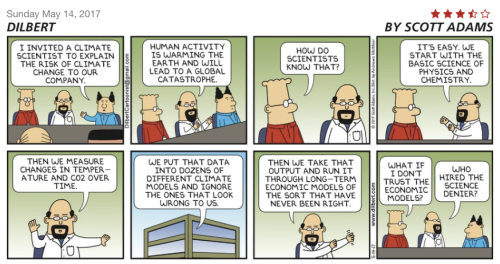Tag: scientists
An Example of Cognitive Dissonance
Guest Post by Scott Adams
What the heck is “climate denial”? Is that even a thing?
I mentioned on Periscope the other day that I created a Sunday comic as a cognitive dissonance trap. I wanted to see if I could make an argument about the reliability of ECONOMIC models and dupe irrational people into labeling me a climate denier.

As you can see below, the experiment worked as planned. Notice the excerpt below leaves out the part of the comic that mentions ECONOMIC models.
SCIENCE DENIER
OOPS – ANTARCTICA IS GAINING ICE – SOMEONE CALL AL GORE

A new NASA study found that Antarctica has been adding more ice than it’s been losing, challenging other research, including that of the UN’s Intergovernmental Panel on Climate Change, that concludes that Earth’s southern continent is losing land ice overall.
In a paper published in the Journal of Glaciology on Friday, researchers from NASA’s Goddard Space Flight Center, the University of Maryland in College Park, and the engineering firm Sigma Space Corporation offer a new analysis of satellite data that show a net gain of 112 billion tons of ice a year from 1992 to 2001 in the Antarctic ice sheet.
That gain slowed to 82 billion tons of ice per year between 2003 and 2008.
Continue reading “OOPS – ANTARCTICA IS GAINING ICE – SOMEONE CALL AL GORE”
Climate Fanatics Run Into Public Relations Snag
Scientists Turn into Stalinists
Last week, we happened across a press report about a group of climate scientists so eager to shut up their critics that they want to employ the State’s police, courts and jailers for the purpose. Specifically, a group of academic (and presumably tenured) climate alarmists supporting the “CAWG” theory (CAWG=”catastrophic anthropogenic global warming”) have written a letter to president Obama, attorney-general Lynch and OSTP director Holdren, demanding that so-called “climate deniers” (or the organizations allegedly supporting them) be prosecuted under the RICO act (you can see the document here (pdf) – already its first paragraph is “alarming”, as they inter alia brag about things they have incorrectly predicted to happen for more than 35 years, such as an increase in “extreme weather”).

This is not the first time that climate alarmists are letting their inner Stalin hang out and are trying to impose a spot of Lysenkoism for the “good of humanity”. For those not au fait with Lysenko: the man was an influential Soviet biologist who came up with an erroneous theory “based on dialectic materialism” about how to improve crop yields. It never worked, but over the 44 years during which his influence lasted (!), more than 3,000 biologists were either fired, jailed and even executed for opposing his views (a number of modern-day radical climate alarmists are also on record for demanding the harshest imaginable punishments for “deniers”).
Continue reading “Climate Fanatics Run Into Public Relations Snag”
Can Scientists Think?
Guest Post by Fred Reed
Euclid Cannot Explain a Hamburger
On the Unz Review I find a piece by Razib Khan, Can a Religious Person be a Good Scientist? His answer, yes, is inarguable since, as he points out, many good scientists are religious (Newton, a Christian, by most accounts did pretty fair work.) But why should it be necessary to ask such a luminously foolish question?
Because we live in luminously foolish times. Mr. Khan cites, not approvingly, a scientist who wanted to have another dismissed from his position for being an evangelical Christian. Why? Well, you see, the manner of thinking of religious people renders them incapable of science.
This makes sense only in terms of bitter hostility to religion. Why can a Christian scientist not study, say, the possibilities of rotaxanes as bistable devices in molecular computers as well as can an atheist or agnostic?
While Christians can think about science, I wonder whether scientists, as scientists, can think about anything else. Are their mental capacities not grossly limited in comparison with those of other people?
It is a question of blinkers. They think inside a box containing only a part of reality.
Logical systems, such as those to which scientists are tightly wed, depend on assumptions and undefined primitives. Their conclusions cannot go beyond results derivable from their assumptions.







